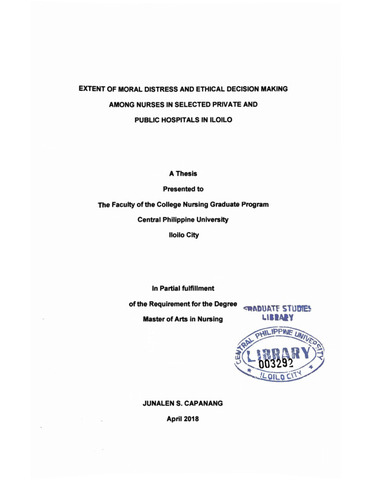Extent of moral distress and ethical decision making among nurses in selected private and public hospitals in Iloilo
| dc.contributor.adviser | Gales, Josephine P. | |
| dc.contributor.author | Capanang, Junalen S. | |
| dc.coverage.spatial | Iloilo | en_US |
| dc.date.accessioned | 2021-07-26T07:54:06Z | |
| dc.date.available | 2021-07-26T07:54:06Z | |
| dc.date.issued | 2018 | |
| dc.identifier.citation | Capanang, J. S. (2018). Extent of moral distress and ethical decision making among nurses in selected private and public hospitals in Iloilo (Unpublished Master’s thesis). Central Philippine University, Jaro, Iloilo City. | en_US |
| dc.identifier.uri | https://hdl.handle.net/20.500.12852/1248 | |
| dc.description | Abstract only | en_US |
| dc.description.abstract | This descriptive-correlational study aimed to determine the extent of moral distress and ethical decision making among nurses in selected private and public hospitals in Iloilo and the relationship among variables. Using the one-shot survey design, 139 respondents were determined through stratified random sampling. Data were collected employing self-administered questionnaire and were computer-processed and analyzed using frequency distribution and means for the descriptive analysis, while Phi and Gamma were used for inferential analysis. Respondents experienced mild moral distress and this indicates that they could perform their duties properly. Nurses have fair ethical decision making which may enable them to provide mediocre patient care at times. Regardless of age, sex, area of assignment and length of service, moral distress experienced by the nurses does not vary. Married nurses and those working in public hospitals experienced moderate to severe moral distress compared to single nurses in private hospital. This affirms the Attribution Theory which states that moral distress is affected by internal cause such as civil status and external cause such as type of hospital. Ethical decision made by the nurse is not influenced by age, civil status, sex, area of assignment, length of service and type of hospital they are working. Mild moral distress can lead to a good ethical decision making among nurses while nurses who are moderately or severely morally distress tend to be just fair decision maker. The theory of attribution which states that internal causes such as moral distress can contribute ethical decision making finds support in this study. Since majority of the nurses have fair ethical decision making, it is recommended that hospital and nursing service administration should establish programs on counselling and teaching that will accommodate, guide and help nurses who are morally disturbed. | en_US |
| dc.format.extent | x, 84 leaves | en_US |
| dc.language.iso | en | en_US |
| dc.subject.ddc | GSL 610.73072 C17 | en_US |
| dc.subject.lcsh | Nurses | en_US |
| dc.subject.lcsh | Nurses--Job stress | en_US |
| dc.subject.lcsh | Nurses--Decision making | en_US |
| dc.subject.lcsh | Philippines--Iloilo | en_US |
| dc.subject.lcsh | Distress (Psychology) | en_US |
| dc.subject.lcsh | Nursing ethics | en_US |
| dc.subject.mesh | Nurses | en_US |
| dc.subject.mesh | Psychological Distress | en_US |
| dc.subject.mesh | Ethics, Nursing | en_US |
| dc.subject.mesh | Decision Making | en_US |
| dc.subject.mesh | Clinical Decision-Making | en_US |
| dc.title | Extent of moral distress and ethical decision making among nurses in selected private and public hospitals in Iloilo | en_US |
| dc.type | Thesis | en_US |
| dc.description.bibliographicalreferences | Includes bibliographical references | en_US |
| dc.contributor.chair | Alibogha, Salex E. | |
| dc.contributor.committeemember | Baldon, Charlie D. | |
| dc.contributor.committeemember | Sale, Melba C. | |
| dc.contributor.committeemember | Canaman, Jessica B. | |
| dc.contributor.department | School of Graduate Studies | en_US |
| dc.description.degree | Master of Arts in Nursing | en_US |


